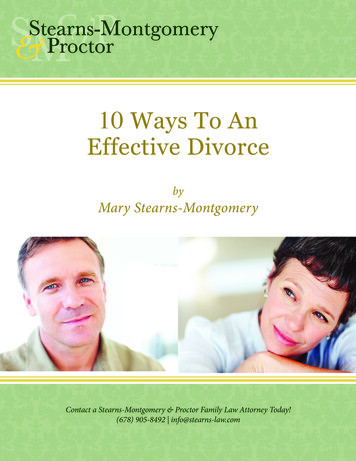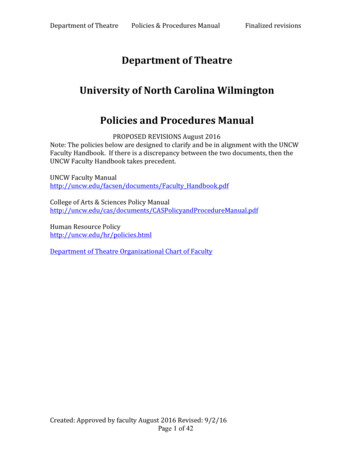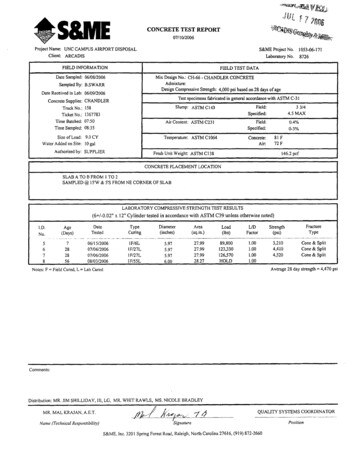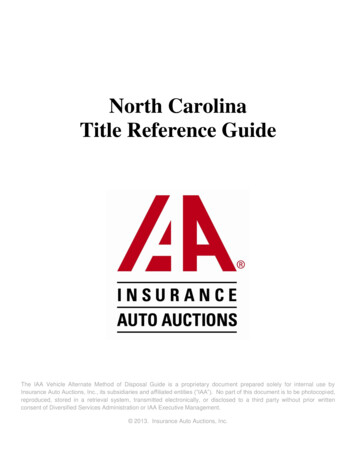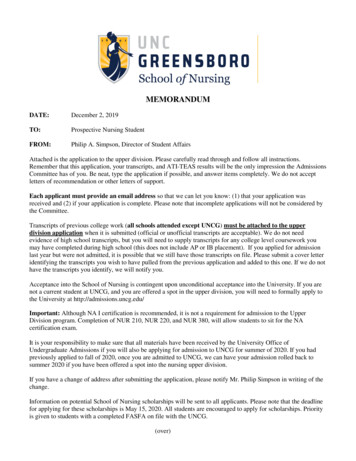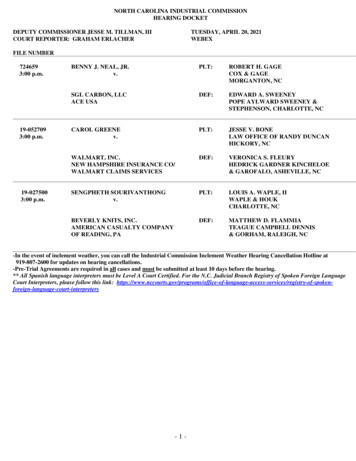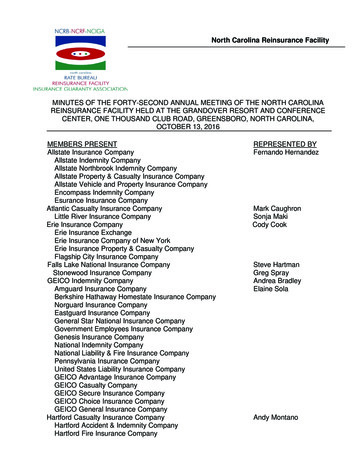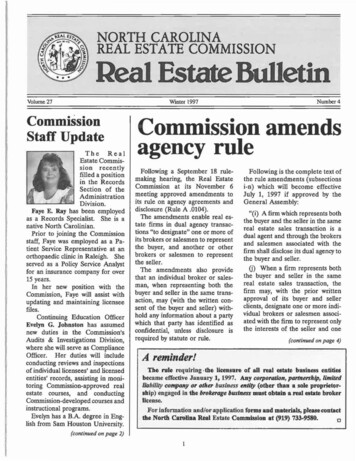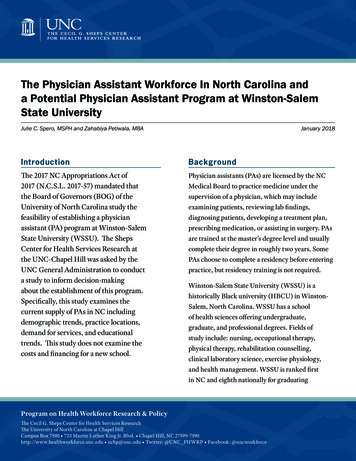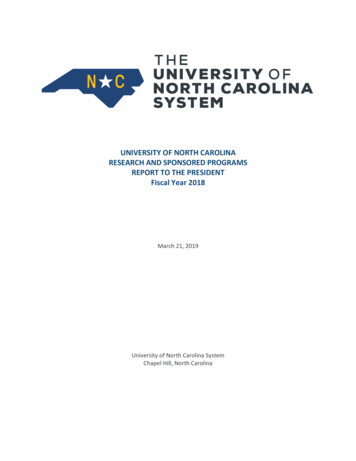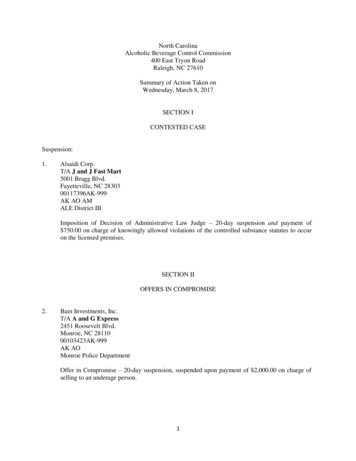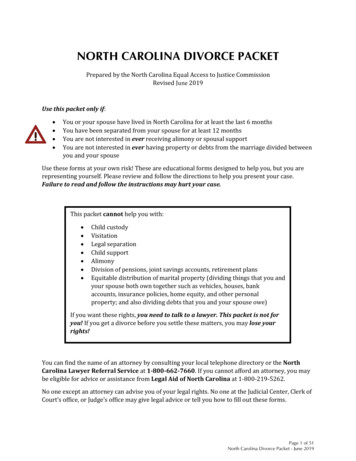
Transcription
NORTH CAROLINA DIVORCE PACKETPrepared by the North Carolina Equal Access to Justice CommissionRevised June 2019Use this packet only if: You or your spouse have lived in North Carolina for at least the last 6 monthsYou have been separated from your spouse for at least 12 monthsYou are not interested in ever receiving alimony or spousal supportYou are not interested in ever having property or debts from the marriage divided betweenyou and your spouseUse these forms at your own risk! These are educational forms designed to help you, but you arerepresenting yourself. Please review and follow the directions to help you present your case.Failure to read and follow the instructions may hurt your case.This packet cannot help you with: Child custodyVisitationLegal separationChild supportAlimonyDivision of pensions, joint savings accounts, retirement plansEquitable distribution of marital property (dividing things that you andyour spouse both own together such as vehicles, houses, bankaccounts, insurance policies, home equity, and other personalproperty; and also dividing debts that you and your spouse owe)If you want these rights, you need to talk to a lawyer. This packet is not foryou! If you get a divorce before you settle these matters, you may lose yourrights!You can find the name of an attorney by consulting your local telephone directory or the NorthCarolina Lawyer Referral Service at 1-800-662-7660. If you cannot afford an attorney, you maybe eligible for advice or assistance from Legal Aid of North Carolina at 1-800-219-5262.No one except an attorney can advise you of your legal rights. No one at the Judicial Center, Clerk ofCourt’s office, or Judge’s office may give legal advice or tell you how to fill out these forms.Page 1 of 51North Carolina Divorce Packet - June 2019
NORTH CAROLINA DIVORCE PACKET TABLE OF CONTENTSThings to Know Before You Begin3Three Reasons to Consider Not Representing Yourself5Steps for Getting an Absolute Divorce7Step One – Completing the Court Forms and Preparing to File8Step Two – How to File the Action for Divorce12Step Three – Serving the Defendant13Step Four – Getting a Hearing Date and Notice of Hearing15Step Five – Going to Court16Tips for Presenting Your Case in Court17Summary18Requirements Checklist19Glossary of Legal Terms20Need More Information?23Forms You Will Need24Complaint for Absolute Divorce25Verification27Civil Action Cover Sheet29Civil Summons31Servicemembers Civil Relief Act33Notice of Hearing35Judgment of Absolute Divorce37Certificate of Service39Certificate of Absolute Divorce or Annulment41Forms You Might Need42Petition to Proceed as an Indigent43Affidavit of Indigency45Affidavit of Service of Process by Registered or Certified Mail47Acceptance of Service49Waiver and Answer51Page 2 of 51North Carolina Divorce Packet - June 2019
THINGS TO KNOW BEFORE YOU BEGIN Your case is called a pro se, or self-represented case, because you are representingyourself instead of hiring a lawyer. Therefore, it is up to you to make sure that the formsand information you present to the court are correct and up-to-date. Since you arerepresenting yourself, you should research the laws, rules of court, and cases that apply toyour case. Fill out all the forms by completing them online, typing on a typewriter, or using a blue orblack pen. Write neatly if you use a pen. Keep copies of everything. Keep at least one copy of all the forms you file for your ownrecords. You must file all forms at the Clerk’s office in the county in which you or your spouse lives.BACKGROUND INFORMATIONAn Absolute Divorce is a complete divorce that allows the parties to marry again after theirdivorce judgment becomes final, or to legally take action as a single individual, such as purchasingproperty or filing taxes as single. North Carolina law requires that the parties be separated for morethan one (1) year before they file for divorce. The parties do not need an agreement to file for anAbsolute Divorce. However, in order for a party to be eligible for an Absolute Divorce in NorthCarolina, the husband or wife must have been a resident of North Carolina for at least six (6)months prior to the filing. You and your spouse must also have lived continuously separate andapart for at least one (1) year and one (1) day before the divorce can be filed. (See below formore information about North Carolina’s separation requirement.) These requirements are set outin North Carolina law (or statutes) at North Carolina General Statute Section 50-6. There are noexceptions to these requirements to get an Absolute Divorce.As you go through the court process, you will be called the Plaintiff, because you have started thecourt process to get an Absolute Divorce. Your spouse will be the Defendant.A case for Absolute Divorce begins when a Complaint is filed with the Court. The Complaint mustcontain a statement of facts to give a person fair notice of the basis for the lawsuit, including astatement of where the party lives and has lived. A sample Complaint is found on page 25 of thisDivorce Packet.In order for the court to reach a binding decision in a case, the court must have Jurisdiction (thepower to require a party to follow its decisions), which it obtains by Service of Process. The Clerkof Court must issue a Summons and the Summons must be served on the Defendant (the spouse ofthe person who started the process for Divorce) in a certain way, which is set out in the court’srules. The easiest way to serve the Defendant is to submit the Summons and a copy of theComplaint to the Sheriff of the county where the Defendant lives. The Sheriff will deliver the papersto the Defendant and provide proof to the court. There are also other methods of acceptable servicethat are described below at page 13-14.Page 3 of 51North Carolina Divorce Packet - June 2019
CAN OR SHOULD I FILE FOR AN ABSOLUTE DIVORCE?Please note that neither the District Court Staff nor anyone in the office of the Clerk of Court areallowed to provide legal advice. Therefore, we cannot tell you if you should file or what youshould file, but we can tell you that you must meet certain requirements to be eligible for anAbsolute Divorce. The Plaintiff is the person beginning the divorce proceeding against theDefendant, who is the spouse (husband or wife) of the Plaintiff. The Plaintiff may file a Complaintfor divorce in North Carolina IF the Plaintiff spouse has been a resident of North Carolina for atleast six (6) months prior to the filing. The couple must have lived continuously separate and apart,where at least one person intends for that separation to be permanent, for at least one (1) year andone (1) day before the divorce can be filed.You should remember that, if you want to receive alimony or spousal support or have acourt help you decide how to divide your marital property and debts, you must raise it byfiling a claim with the court before your Divorce is final. If the Judge signs a Judgment forAbsolute Divorce before these issues are raised, you will lose your right to raise it forever.You should talk to an attorney if you have questions about these topics.DO I HAVE TO HAVE A COURT ORDER TO BEGIN A PHYSICAL SEPARATION?No, you do not need a court order to be legally separated in North Carolina. As long as you and yourspouse are living in separate residences and at least one of you intends the separation to bepermanent, then the time you spend living apart will qualify for a one-year waiting period for adivorce.A person might be able to sign a Separation Agreement (a Separation Agreement is a contractbetween both spouses to settle issues such as property division, child custody, alimony, andequitable distribution) or get a court order (called a Divorce from Bed and Board), either of whichcan free both spouses from legal responsibility for the other spouse. This step is not required tostart the one-year separation clock for the purposes of getting an Absolute Divorce – only physicalseparation is required for that. If you are interested in taking the step of getting a court order or aSeparation Agreement to separate your legal responsibility from your spouse before obtaining anAbsolute Divorce, you should talk to an Attorney.HOW MUCH DOES IT COST TO GET AN ABSOLUTE DIVORCE?The fee for filing a case for divorce is currently 225.00. You will also need either 30.00 to have theSheriff serve the Defendant, or 7.00 to serve the Defendant by certified mail. If you are including aclaim for “Resumption of Maiden Name,” there may be an additional 10.00 fee. These fees aresubject to change.If you cannot afford these costs, you might qualify to proceed as an Indigent. See page 10 for moreinformation about the requirements to file a case as an Indigent.Page 4 of 51North Carolina Divorce Packet - June 2019
THREE REASONS TO CONSIDER NOT REPRESENTING YOURSELF1. PRESENCE OF DOMESTIC VIOLENCEIf you have been the victim of physical or emotional abuse during your marriage, you may notwant to represent yourself in an Absolute Divorce case. In abusive relationships, sometimes theact of filing the Complaint for an Absolute Divorce may further anger the abusive spouse. Manyabusive spouses are very controlling. Your spouse may think you are trying to challenge his orher authority. If your spouse has hurt you in the past and you are afraid of your spouse now,you may want to reconsider handling your case yourself and seek representation by a privateattorney. You may also want to consider filing for a Domestic Violence Protective Order. Moreinformation can be obtained by contacting the Domestic Violence Service Provider in yourcounty (a list is available at nccadv.org/get-help) or by calling the National Domestic ViolenceHotline at 1-800-799-7233.Ultimately, the choice to represent yourself is your own decision. Some factors you may want toconsider when making your decision include: Do I think my spouse will become very angry when I file this and try to do something to getback at me?Do I have a safe space to stay after I file for divorce, while I am waiting for the Sheriff toserve my spouse with the absolute divorce papers, and after my spouse gets the divorcepapers?Have I had to get a protective order against my spouse in the past?Has my spouse followed the terms of any protective order?2. EQUITABLE DIVISION OF MARITAL PROPERTY OR DEBTSOnce an Absolute Divorce Judgment has been granted, neither you nor your ex-spouse canask the court for a division of marital property or marital debts. To preserve a claim tomarital property or debts, you must file with the Clerk of Court a claim for EquitableDistribution of Marital Property prior to filing your Absolute Divorce Judgment.Marital property consists of any real or personal property acquired by either spouse during thecourse of the marriage, and before the spouses’ separation. Examples of marital property mayinclude the marital home, land, vehicles, furniture, and retirement plans (for example, 401k orIRA). Marital property can include marital debt (for example, credit cards and medical bills).If you have marital property or debts you wish to divide, you will need to file for EquitableDistribution of the marital property – either at the same time you file for Absolute Divorce orbefore the divorce judgment is entered.You should seek the assistance of a private attorney in filing for your Absolute Divorce andEquitable Distribution of marital property.Page 5 of 51North Carolina Divorce Packet - June 2019
3. ALIMONY AND POSTSEPARATION SUPPORTAlimony and Postseparation Support are forms of spousal support. Alimony is money paid to aspouse or ex-spouse. Postseparation Support is money paid to a spouse for a specific period oftime, generally temporary, until the court orders or denies an award of Alimony. You may beeligible for Alimony or Postseparation Support if: You are substantially dependent upon your spouse for your maintenance and supportorYou are substantially in need of maintenance and support from your spouse.The court will consider many factors to determine whether or not you are eligible for Alimonyor Postseparation Support. Some of these factors include: marital misconduct, earnings andearning capacity of each spouse, how long you have been married, contributions each of youhave made to the marriage and your standard of living, your ages and physical and mentalconditions, property that you own, and the needs of each spouse. There are many other factorsthat the court may consider.Once an Absolute Divorce Judgment has been granted, neither you nor your ex-spouse canask the court for spousal support. To preserve a claim to spousal support, you must file withthe Clerk of Court a claim for spousal support prior to having your Absolute Divorce Judgmentsigned by a Judge and filed.You should seek the advice of a private attorney in filing for your Absolute Divorce and Alimonyor Postseparation Support.Page 6 of 51North Carolina Divorce Packet - June 2019
STEPS FOR GETTING AN ABSOLUTE DIVORCEBefore beginning this process, read this complete packet and make sure you understand thisprocess. If you have any questions or are not sure if this is the best route for your situation, talk toan attorney.STEP ONESTEP TWOComplete theCourt Forms(see page 8)File Court Papers in theClerk of Court's office(see page 12)STEP THREESTEP FOURServe the Papers on theDefendant (your Spouse)(see page 13)Wait 30 days, then setdate for Hearing(see page 15)STEP FIVEGo to Court withprepared Judgmentfor Judge's review(see page 16)Page 7 of 51North Carolina Divorce Packet - June 2019
STEP ONE – COMPLETING THE COURT FORMS AND PREPARING TO FILETo begin a case for Absolute Divorce, you will need the complete following forms:1.2.3.4.Complaint for Absolute DivorceDomestic Civil Action Cover Sheet (AOC-CV-750)Civil Summons (AOC-CV-100)Servicemembers Civil Relief Act Affidavit (AOC-G-250)Note: You might need a Petition to Proceed as an Indigent (used if you cannot a
Use these forms at your own risk! These are educational forms designed to help you, but you are representing yourself. Please review and follow the directions to help you present your case. Failure to read and follow the instructions may hurt your case. You can find the name of an attorney by consulting your local telephone directory or the North Carolina Lawyer Referral Service at 1-800-662 .
